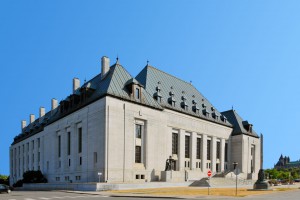Supreme Court of Canada: On February 26, 2015, the Supreme Court of Canada delivered a landmark judgment, which has once again rekindled debate regarding right to die. The Court by its unanimous decision struck down Sections 241(b) and 14 of the Canadian Criminal Code which criminalizes counselling or aiding suicide. The Supreme Court held that legislative provisions are unconstitutional to the extent “they prohibit physician-assisted death for a competent adult person who (1) clearly consents to the termination of life and (2) has a grievous or irremediable medical condition (including an illness, disease or disability) that causes enduring suffering that is intolerable to the individual in the circumstances of his or her condition.”. The Court added, “Irremediable … does not require the patient to undertake treatments that are not acceptable to the individual. The scope of this declaration is intended to respond to the factual circumstances in this case. We make no pronouncement on other situations where physician-assisted dying may be sought.” The Court however suspended its declaration of invalidity for 12 months. The Court also left open the legislative and regulatory response to the Judgment.
In arriving at the decision that Sections 241 and 14 of the Criminal Code are unconstitutional, the Court relied on Section 7 of the Canadian Charter of Rights and Freedoms which guarantees “Everyone has the right to life, liberty and security of the person and the right not to be deprived thereof except in accordance with the principles of fundamental justice.”
The suspension of the Court’s declaration was operative up to February 6, 2016 but in the meantime the Attorney General of Canada applied for extension of term for another six months. Exemptions were also sought in individual cases who wanted to exercise their right to die. This time it was a split opinion though the entire Court agreed that extension could be granted for four months only. On individual exemptions, the majority comprising of Abella, Karakatsanis, Wagner, Gascon and Cote, JJ, made the following observations, “An exemption can mitigate the severe harm that may be occasioned to those adults who have a grievous, intolerable and irremediable medical condition by making a remedy available now pending Parliament’s response. The prejudice to the rights flowing from the four-month extension outweighs countervailing considerations. …during the four-month extension period, we grant an exemption to those who wish to exercise their rights so that they may apply to the superior court of their jurisdiction for relief in accordance with the criteria set out in … Carter.” As against this, the dissenting view comprising the Chief Justice, Cromwell, Moldaver and Brown, JJ, firmly turned down request for individual exemptions in the following words, “… We do not underestimate the agony of those who continue to be denied access to the help that they need to end their suffering. That should be clear from the Court’s reasons for judgment on the merits. However, neither do we understand the complexity of the issues that surround the fundamental question of when it should be lawful to commit acts that would otherwise constitute criminal conduct. The complexity results not only from the profound moral and ethical dimensions of the question, but also from the overlapping federal and provincial legislative competence in relation to it. The Court unanimously held in its judgment on the merits that these are matters most appropriately addressed by the legislative process. We remain of that view. That the legislative process needs more time is regrettable, but it does not undermine the point that it is best way to address this issue.” [Carter v. Canada (Attorney General), 2015 SCC OnLine Can SC 1, decided on February 6, 2015]

